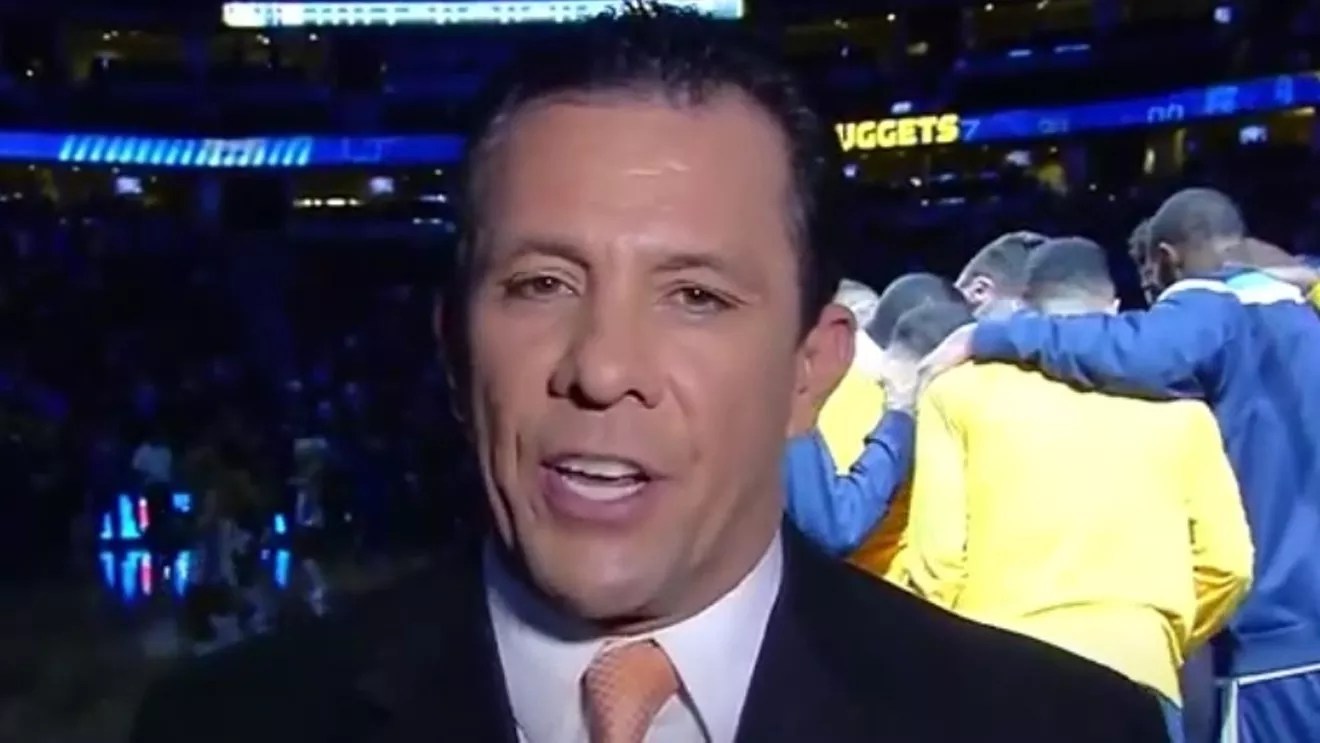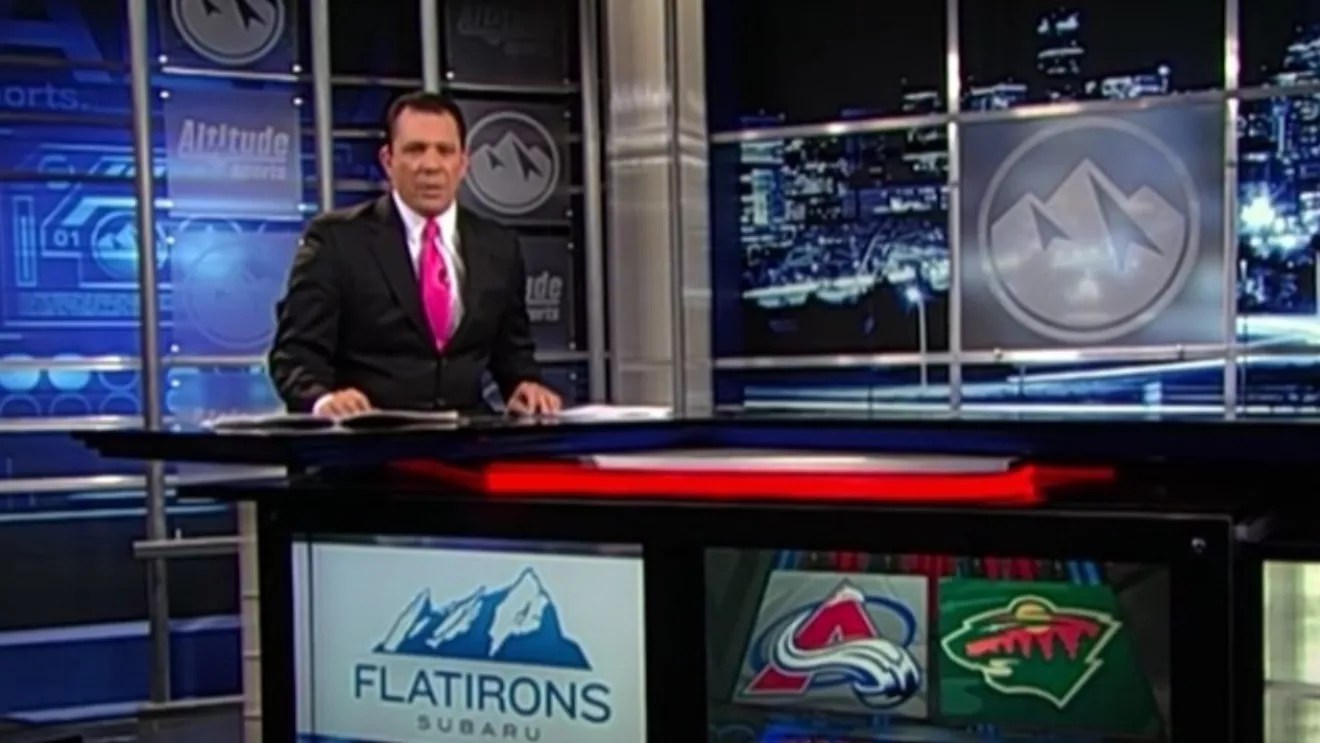

Audio By Carbonatix
In March 2021, veteran sportscaster Todd Romero sued Altitude TV, his employer of nearly a decade, for allegedly discriminating against him because of race, age and his decision to seek treatment for prescription-drug dependency. But he continued working for Altitude, the broadcast home of the Denver Nuggets and the Colorado Avalanche, on a non-contractual basis despite what he sees as the company’s efforts “to demean me and make me feel less than” over the next two-plus years.
Then came what Romero considers to be the final insult. On October 23, he was informed that his job, performed under the auspices of Altitude Sports & Entertainment and Kroenke Sports & Entertainment, the two defendants named in the suit, had been eliminated in a company-wide cost-cutting measure, as opposed to an action specifically targeting him.
Not that he believes that. “I knew the end was coming,” Romero says. “But I didn’t think they would do this with such petty retaliation because I raised issues of equity in the workplace.”
Such claims are scheduled to be heard at trial in March 2024 – if the case survives until then. Representatives for Altitude and Kroenke Sports (owned by gazillionaire Stan Kroenke, whose portfolio also includes the Nuggets and Avs) haven’t responded to requests for comment. But on May 31, attorneys for Altitude submitted a motion for summary judgment in which they requested that the matter be thrown out of U.S. District Court.
Stacey Campbell of Denver-based Campbell Litigation, who represents Romero, responded with a formal reply countering Altitude’s arguments – and he thinks the company now jettisoning Romero further bolsters his client’s contentions.
“Although Altitude and Kroenke Sports claim Mr. Romero’s termination was a reduction in force, Mr. Romero was the only full-time on-air talent to be let go and the only full-time on-air talent to have sued the company for discrimination and retaliation,” Campbell says.
In his original Altitude TV bio, Romero, who’s in his late fifties, notes that he was born in the Mile High City, raised in Fort Collins, and graduated from the University of Denver in 1986 with a degree in mass communications and journalism. He subsequently spent five years on the staff of 9News before leaving Colorado for TV gigs in Kansas City and Orlando, as well as a position with World Wrestling Entertainment. He returned to the state in 2012, when Altitude offered him the opportunity to cover the Nuggets, one of his favorite teams since childhood. He saw his first game by the squad (known at the time as the Denver Rockets) in 1969; he was five years old and the franchise was two. Over many subsequent seasons, he closely followed all of the team’s ups and downs.
“I watched Ralph Simpson and Dan Issel and David Thompson, who’s a friend of mine. I talk to him every couple of weeks,” Romero reveals. “There’s not a lot of people in this business who’ve known what I know about the Nuggets.”
But by the time the Nuggets had its first-ever championship season, he was no longer covering the team regularly. “Oh, my God, dude,” he recalls. “It was so painful.”
The contrast between his status then and Romero’s early years at Altitude is stark. An excerpt from the lawsuit notes that he “has hosted pre- and postgame shows for the Nuggets and Avalanche, provided play-by-play analysis for high school football and for the University of Denver men’s and women’s basketball teams. Romero has maintained excellent performance, recently reflected by an Emmy award with the 2018 Nuggets broadcast team, and two Emmy nominations he received during 2019.”
The suit contends that during his time at Altitude TV, “most, if not all, on-air talent, including Romero, received employment contracts.” In January 2016, Romero signed a two-year pact with an option for a one-year extension through January 2019; he earned $95,481 in year one and $98,345 in year two, with $101,295.55 earmarked for the potential year three. But in June and July of 2016, Romero used his accrued vacation time to enter a rehabilitation facility that he hoped would help him stop taking the sleeping medication he was prescribed after hurting his neck. But after he successfully kicked his habit and returned to work, the complaint maintains that he was treated like damaged goods.
In September 2017, the lawsuit claims, one executive told Romero that he was being “significantly underpaid” and deserved a new contract with a salary bump to $140,000. But the next month, the same executive reportedly told Romero that his higher-ups had rejected the suggestion “in part because Romero went to rehab to address his addiction.”
After that, the suit asserts, the exec changed his story, saying that negotiations for a new pact could begin after Romero completed the third year under his previous contract – and when his pay inched up to just over $100,000 as scheduled, he thought Altitude TV had picked up his option. He later learned that wasn’t the case; the exec said he and everyone else would be moved to “at-will employment instead of contracts.” But the complaint posits that at least seven of Romero’s co-workers had received contracts – all of them “non-Hispanic, non-brown-skin colored, and/or non-disabled/regarded as disabled.”

Opportunities for Todd Romero at Altitude evaporated, his lawsuit claims.
In subsequent years, Romero’s face time ebbed. Rather than being allowed to continue with his Nuggets hosting duties amid the 2020-2021 NBA season, the suit says he was “relegated to appearing in feature stories, which are typically four- to five-minute pre-recorded video pieces aired during the pre-game show of the Nuggets game’s broadcast.”
Romero subsequently filed a discrimination charge with the federal Equal Employment Opportunity Commission and received a January 2021 right-to-sue letter from the agency. The document led directly to the current lawsuit, whose arguments Altitude and KSE blasted in its motion for summary judgment just over two years later – and withering sarcasm was among the weapons deployed.
According to the motion, plaintiff Romero “envisions his role on the broadcast team to be akin to that of Nuggets two-time MVP Nikola Jokic, when he is in fact a role player. Given his sense of self-worth, Plaintiff believes he should be paid
the same as the network’s top stars and that he should get his pick of the broadcasting opportunities at Altitude.” But “contrary to Plaintiff’s allegations, the evidence makes clear that Altitude has given Plaintiff multiple raises, bonuses, and significant on-air opportunities, including hosting his own shows. Altitude has never reduced Plaintiff’s compensation or benefits or otherwise demoted him. In addition, the decisions about which Plaintiff complains do not rise to the level of tangible employment action and, regardless, were based upon legitimate, non-discriminatory reasons,” including Altitude’s dispute with Comcast, which stopped carrying its programming in 2019.
The motion also holds that when Romero complained about “new talent…getting more and better opportunities than him,” he was told by his immediate supervisor that while there was a place for him at the network, “he was simply not Altitude’s ‘starting quarterback.’ While Plaintiff wanted hosting and play-by-play opportunities, feature work was best suited to his strengths.” He was bumped from hosting a program called Sports Social in part because he “did not have as strong a social media presence as other talent,” and during a July 30, 2020, guest appearance on the show, he was “allegedly in such a visibly altered state that Altitude made the business judgment not to air the program.”
This reference alludes to Romero’s relapse regarding controlled substances, which his lawsuit attributes to “severe emotional distress” caused by the “persistent discriminatory treatment” to which he had been subjected.
After successfully completing his second rehab stint, Romero returned to Altitude in what he describes as an even more diminished role. “I did a betting show for two years – You Bet Tonight. But even though I was supposed to be the host of it, [colleague] Nate Lundy did most of the talking. And I also did DU and Air Force basketball, but all but two games were on Altitude 2,” a sister service that “is pretty much an afterthought. Finding Altitude 1 is hard enough when Comcast isn’t televising you. You really have to make an effort to find Altitude 2.”
Now, even these platforms are gone, and attorney Campbell sees a connection between the lawsuit and Romero’s dismissal. “When Mr. Romero’s employment was terminated,” he allows, “Altitude and Kroenke Sports gave him a waiver to review and sign that would have had him waive his claims against the company that are pending in court. Mr. Romero refused to sign those.”
Campbell underscores a key reason for this choice: “Mr. Romero has an age-discrimination claim against the company, and when an employee is supposedly terminated because of a reduction in force, the company is supposed to provide information about that, including the jobs and the ages of the people selected. But we did not see any of that information in the waiver that Mr. Romero was given.”
The judge handling the lawsuit has until the March court date to rule on Altitude/KSE’s motion for summary judgment – and Romero is hopeful the matter will continue to trial.
“This isn’t just about me,” he emphasizes. “National Hispanic Heritage Month just went by, and one of my goals is to be someone who makes a difference. Most Latino people you see aren’t represented in a fair manner, which is sad to me. I’m not even angry – I’m sad. But they picked the wrong person to try to beat up and intimidate.”
Click to read Todd Romero v. Altitude Sports & Entertainment, et al., and the motion for summary judgment.